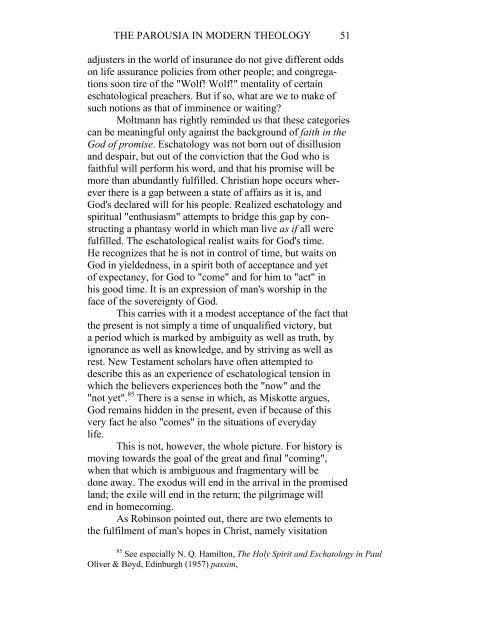the parousia in modern theology: some questions ... - Tyndale House
the parousia in modern theology: some questions ... - Tyndale House
the parousia in modern theology: some questions ... - Tyndale House
You also want an ePaper? Increase the reach of your titles
YUMPU automatically turns print PDFs into web optimized ePapers that Google loves.
THE PAROUSIA IN MODERN THEOLOGY 51<br />
adjusters <strong>in</strong> <strong>the</strong> world of <strong>in</strong>surance do not give different odds<br />
on life assurance policies from o<strong>the</strong>r people; and congrega-<br />
tions soon tire of <strong>the</strong> "Wolf! Wolf!" mentality of certa<strong>in</strong><br />
eschatological preachers. But if so, what are we to make of<br />
such notions as that of imm<strong>in</strong>ence or wait<strong>in</strong>g?<br />
Moltmann has rightly rem<strong>in</strong>ded us that <strong>the</strong>se categories<br />
can be mean<strong>in</strong>gful only aga<strong>in</strong>st <strong>the</strong> background of faith <strong>in</strong> <strong>the</strong><br />
God of promise. Eschatology was not born out of disillusion<br />
and despair, but out of <strong>the</strong> conviction that <strong>the</strong> God who is<br />
faithful will perform his word, and that his promise will be<br />
more than abundantly fulfilled. Christian hope occurs wher-<br />
ever <strong>the</strong>re is a gap between a state of affairs as it is, and<br />
God's declared will for his people. Realized eschatology and<br />
spiritual "enthusiasm" attempts to bridge this gap by con-<br />
struct<strong>in</strong>g a phantasy world <strong>in</strong> which man live as if all were<br />
fulfilled. The eschatological realist waits for God's time.<br />
He recognizes that he is not <strong>in</strong> control of time, but waits on<br />
God <strong>in</strong> yieldedness, <strong>in</strong> a spirit both of acceptance and yet<br />
of expectancy, for God to "come" and for him to "act" <strong>in</strong><br />
his good time. It is an expression of man's worship <strong>in</strong> <strong>the</strong><br />
face of <strong>the</strong> sovereignty of God.<br />
This carries with it a modest acceptance of <strong>the</strong> fact that<br />
<strong>the</strong> present is not simply a time of unqualified victory, but<br />
a period which is marked by ambiguity as well as truth, by<br />
ignorance as well as knowledge, and by striv<strong>in</strong>g as well as<br />
rest. New Testament scholars have often attempted to<br />
describe this as an experience of eschatological tension <strong>in</strong><br />
which <strong>the</strong> believers experiences both <strong>the</strong> "now" and <strong>the</strong><br />
"not yet". 85 There is a sense <strong>in</strong> which, as Miskotte argues,<br />
God rema<strong>in</strong>s hidden <strong>in</strong> <strong>the</strong> present, even if because of this<br />
very fact he also "comes" <strong>in</strong> <strong>the</strong> situations of everyday<br />
life.<br />
This is not, however, <strong>the</strong> whole picture. For history is<br />
mov<strong>in</strong>g towards <strong>the</strong> goal of <strong>the</strong> great and f<strong>in</strong>al "com<strong>in</strong>g",<br />
when that which is ambiguous and fragmentary will be<br />
done away. The exodus will end <strong>in</strong> <strong>the</strong> arrival <strong>in</strong> <strong>the</strong> promised<br />
land; <strong>the</strong> exile will end <strong>in</strong> <strong>the</strong> return; <strong>the</strong> pilgrimage will<br />
end <strong>in</strong> homecom<strong>in</strong>g.<br />
As Rob<strong>in</strong>son po<strong>in</strong>ted out, <strong>the</strong>re are two elements to<br />
<strong>the</strong> fulfilment of man's hopes <strong>in</strong> Christ, namely visitation<br />
85 See especially N. Q. Hamilton, The Holy Spirit and Eschatology <strong>in</strong> Paul<br />
Oliver & Boyd, Ed<strong>in</strong>burgh (1957) passim,

















